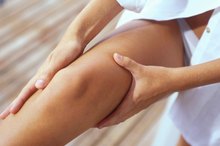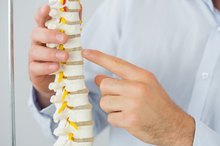What does fact checked mean?
At Healthfully, we strive to deliver objective content that is accurate and up-to-date. Our team periodically reviews articles in order to ensure content quality. The sources cited below consist of evidence from peer-reviewed journals, prominent medical organizations, academic associations, and government data.
The information contained on this site is for informational purposes only, and should not be used as a substitute for the advice of a professional health care provider. Please check with the appropriate physician regarding health questions and concerns. Although we strive to deliver accurate and up-to-date information, no guarantee to that effect is made.
Can Vitamins Help Reduce Stiff Muscles in the Lower Back & Butt?
Muscle stiffness most commonly affects the muscles of the back, hips and shoulders. Many lifestyle choices lead to back and buttock stiffness, such as exercise, sleep disturbances and nutritional deficiencies. People often reduce muscle stiffness by taking one or more supplements. Supplements should be taken under the supervision of your health care provider.
Magnesium
Every organ and system in the body utilizes magnesium. It aids enzymes, regulates minerals and contributes to energy production. Also, while calcium helps muscles to contract, magnesium helps muscles to relax. The recommended amount of magnesium for adults is between 270 and 400 miligrams, depending on size and sex of the individual.
- Every organ and system in the body utilizes magnesium.
- It aids enzymes, regulates minerals and contributes to energy production.
Potassium
Can Certain Vitamins Help Weak Leg Muscles?
Learn More
Potassium is a mineral and electrolyte that is utilized throughout the body. It aids in the function of smooth, skeletal and cardiac muscles and helps with the conduction of electricity in the body. Potassium deficiency usually results from excessive loss through the urine or intestines. The recommended intake of potassium for adults is 2,000 mg.
- Potassium is a mineral and electrolyte that is utilized throughout the body.
- It aids in the function of smooth, skeletal and cardiac muscles and helps with the conduction of electricity in the body.
Vitamin D
Vitamin D is a fat soluble vitamin that aids in calcium balance, immunity, blood pressure regulation, insulin secretion and cell growth. Vitamin D deficiency causes muscle weakness, pain and stiffness. Also, low levels of vitamin D are linked to calcium deficiency and osteoporosis. The recommended daily allowance of Vitamin D for adults is 15 micrograms.
- Vitamin D is a fat soluble vitamin that aids in calcium balance, immunity, blood pressure regulation, insulin secretion and cell growth.
- Also, low levels of vitamin D are linked to calcium deficiency and osteoporosis.
Omega-3 Fatty Acids
Muscle Weakness & Nutrition
Learn More
Omega-3 fatty acids are part of a category of poly-unsaturated fats that the body cannot manufacture but must obtain from the diet. Omega-3 fatty acids are important for brain development, growth and function. Research indicates that omega-3 fats have anti-inflammatory properties as well. The recommended intake of omega-3 fatty acids varies between 1 and 4 grams per day, depending on medical history and dietary intake 1.
- Omega-3 fatty acids are part of a category of poly-unsaturated fats that the body cannot manufacture but must obtain from the diet.
- Research indicates that omega-3 fats have anti-inflammatory properties as well.
Related Articles
References
- University of Maryland Medical Center: Omega-3 fatty acids
- University of Maryland Medical Center: Magnesium
- University of Maryland Medical Center: Potassium
- Linus Pauling Institute at Oregon State University: Vitamin D
- None
- None
- None
- None
- None
- None
- None
- None
- None
- None
- None
- None
- None
- None
- None
- None
- None
- None
- None
- None
- None
- None
- None
- None
- None
- None
- None
- None
- None
- None
- None
- None
- None
- None
- None
- None
- None
- None
Writer Bio
Lisa Ellis began writing professionally in 2003. Ellis' articles are published online at CE Solutions and Medic-CE for continuing education credits for EMTs. She graduated with a Bachelor of Arts in biology from Austin College. Since receiving her doctor of Chiropractic in 2010 from Parker College, Ellis works a chiropractor promoting wellness and healthy lifestyles.








